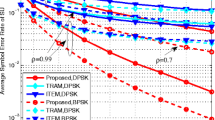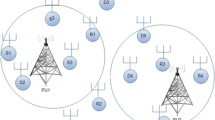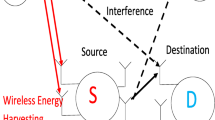Abstract
For multiple-input multiple-output cognitive radio systems, we propose an optimal single transmit and receive antenna selection scheme which maximizes the signal-to-interference-and-noise ratio. Considering peak interference power constraint, peak transmit power constraint, and interference from primary transmitter to cognitive receiver, we theoretically derive the exact system outage probability. It is shown that the theoretical results match simulation results.




Similar content being viewed by others
References
Zhang, R., & Liang, Y. C. (2008). Exploiting multi-antennas for opportunistic spectrum sharing in cognitive radio networks. IEEE Journal on Selected Topics in Signal Processing, 2(1), 88–102.
Devroye, N., Mirtran, P., & Tarokh, V. (2006). Achievable rates in cognitive radio channels. IEEE Transactions on Information Theory, 52(5), 1813–1827.
Bao, X., Martins, P., Song, T., & Shen, L. (2011). Capacity of hybrid cognitive network with outage constraints. IET Communications, 5(18), 2712–2720.
Choi, Y. J., Pak, W., Xin, Y., & Rangarajan, S. (2012). Throughput analysis of cooperative spectrum sensing in Rayleigh-faded cognitive radio systems. IET Communications, 6(9), 1104–1110.
Musavian, L., & Aissa, S. (2008). Outage-constrained capacity of spectrum sharing channels in fading environments. IET Communications, 2(6), 724–732.
Sanayei, S., & Nosratinia, A. (2004). Antenna selection in MIMO systems. IEEE Communications Magazine, 42(10), 68–73.
Kurniawan, E., Madhukumar, A. S., & Chin, F. (2007). Antenna selection technique for MIMO-OFDM systems over frequency selective Rayleigh fading channel. IET Communications, 1(3), 458–463.
Coskun, A. F., & Kucur, O. (2011). Performance analysis of joint single transmit and receive antenna selection in non-identical Nakagami-m fading channels. IET Communications, 5(14), 1947–1953.
Lu, H. Y., & Fang, W. H. (2007). Joint transmit/receive antenna selection in MIMO systems based on the priority-based genetic algorithm. IEEE Antenna and Wireless Propagation Letters, 6(12), 588–591.
Torabi, M., & Haccoun, D. (2011). Performance analysis of joint user scheduling and antenna selection over MIMO fading channels’. IEEE Signal Processin Letters, 18(4), 235–238.
Wang, H., Lee, J., Kim, S., & Hong, D. (2010). Capacity enhancement of secondary link through spatial diversity in spectrum sharing. IEEE Transactions on Communication, 9(2), 494–499.
Wang, Y., & Coon, J. P. (2011). Difference antenna selection and power allocation for wireless cognitive systems. IEEE Transactions on Communications, 59(12), 3494–3503.
Hanif, M. F., Smith, P. J., Taylor, D. P., & Martin, P. A. (2011). MIMO cognitive radios with antenna selection. IEEE Transactions on Communication, 10(11), 3688–3699.
Hung, C. C., Chiang, C. T., Yen, N. Y., & Wu, R. C. (2010). Outage probability of multiuser transmit antenna selection/maximal-ratio combining systems over arbitrary Nakagami-m fading channels. IET Communications, 4(1), 63–68.
Makki, B., Seifi, N., & Eriksson, T. (2012). Multi-user diversity with two-step channel state information feedback. IET Communications, 6(9), 1119–1125.
Papoulis, A. (1991). Probability, random variables, and stochastic processes (3rd ed.). New York: McGraw-Hill.
Acknowledgments
This work was supported by the National Natural Science Foundation of P. R. China (61173148 and 61202498), the Scientific and Technological Project of Guangzhou City (12C42051578).
Author information
Authors and Affiliations
Corresponding author
Rights and permissions
About this article
Cite this article
Zhang, Q., Qin, J. Outage Probability Analysis of MIMO Cognitive Radios with Single Transmit and Receive Antenna Selection. Wireless Pers Commun 79, 1435–1443 (2014). https://doi.org/10.1007/s11277-014-1938-1
Published:
Issue Date:
DOI: https://doi.org/10.1007/s11277-014-1938-1




